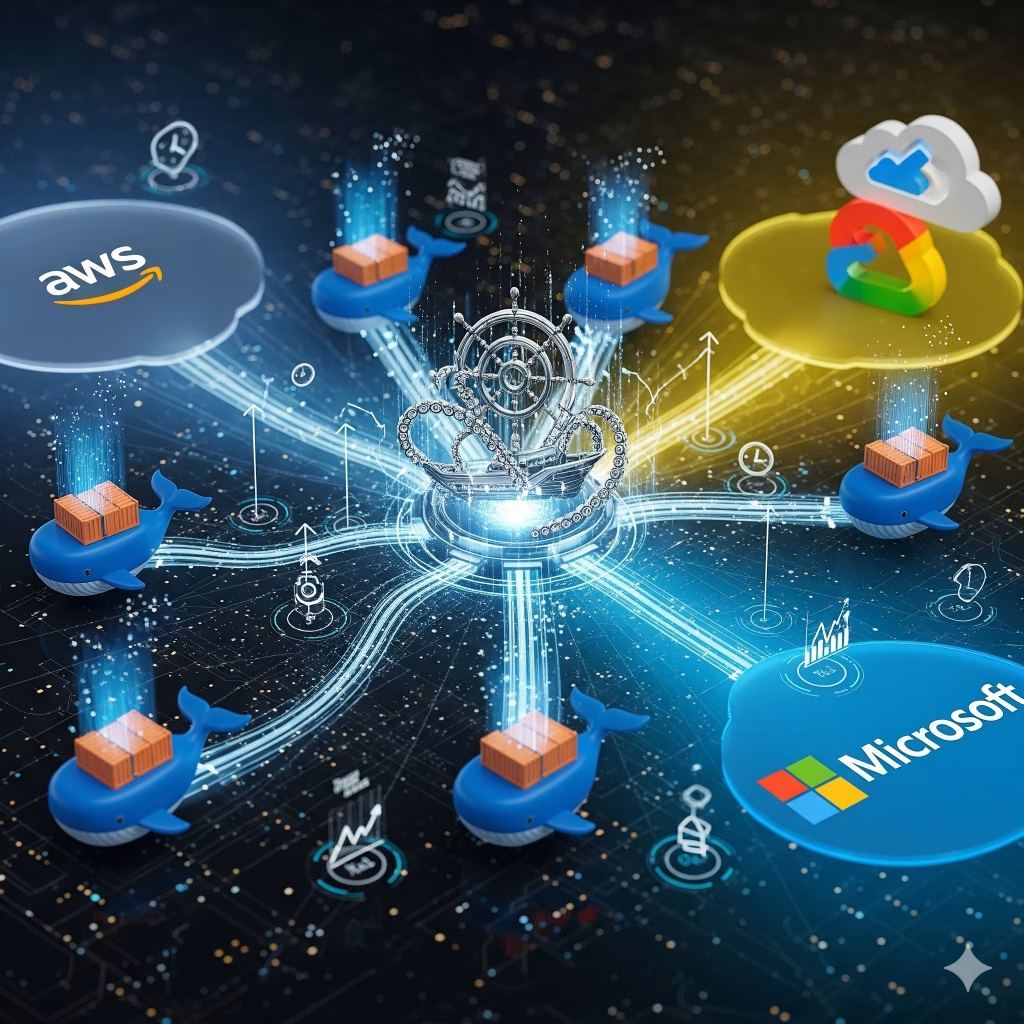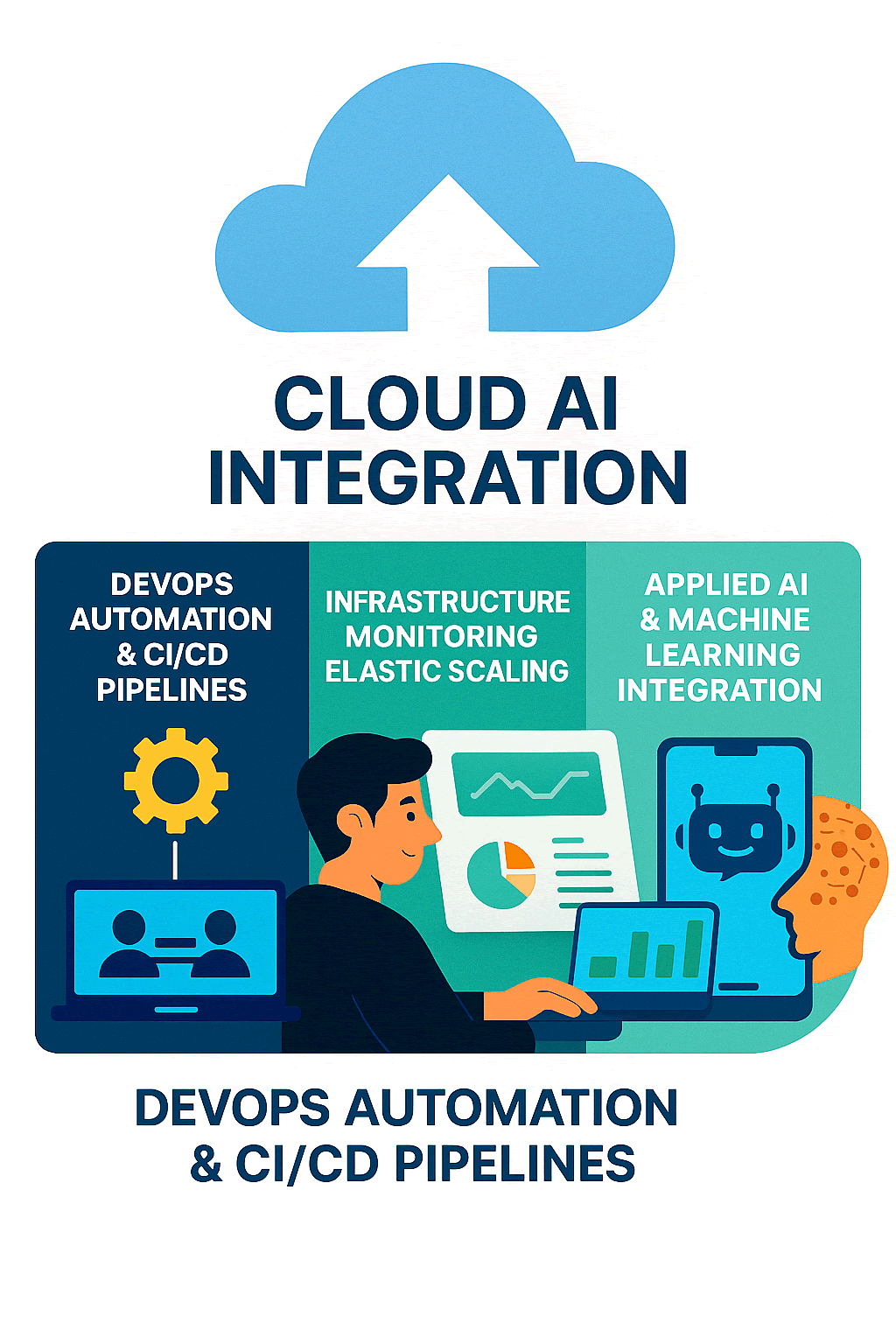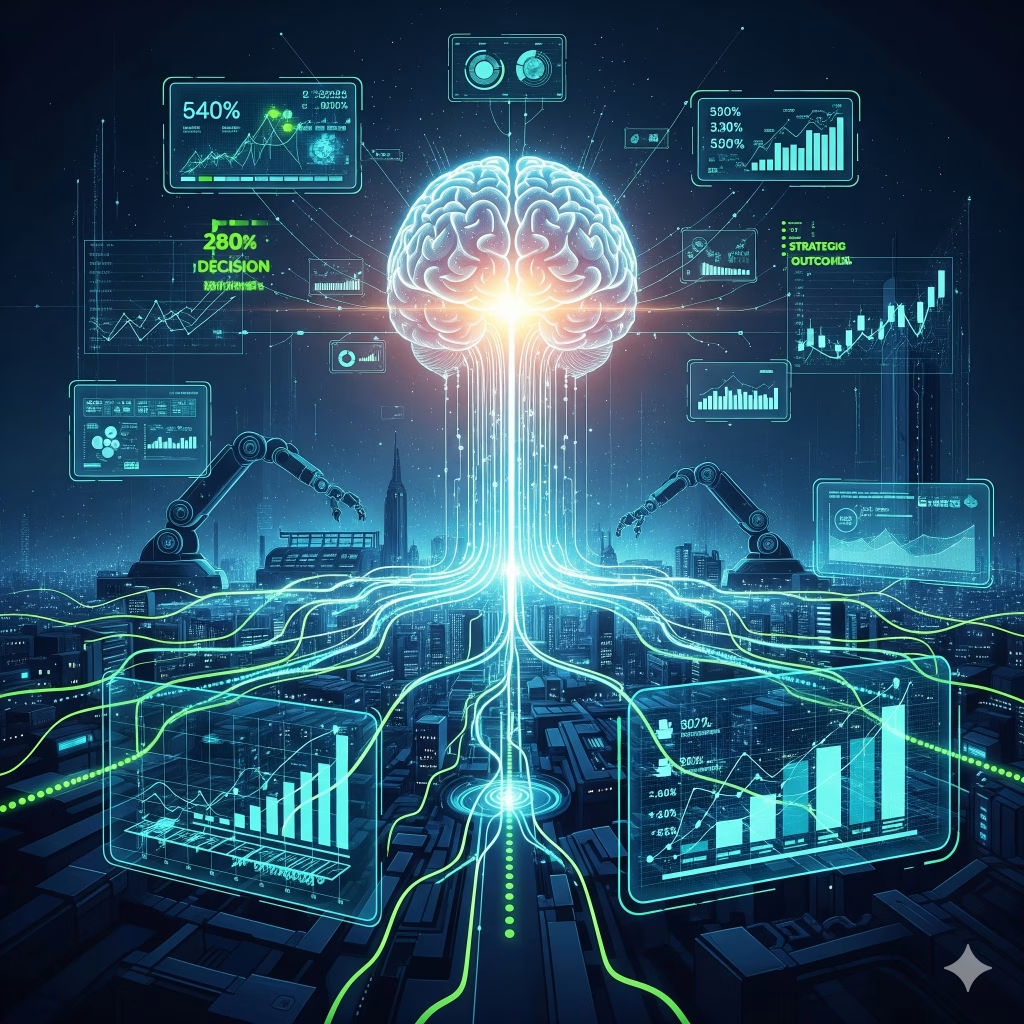AI CLOUD INTEGRATION
We unify development, automation, and intelligence into a single continuous delivery strategy that empowers your digital infrastructure to scale, learn, and adapt efficiently. We streamline your development lifecycle with fully automated CI/CD pipelines utilizing GitHub Actions, GitLab CI, or Jenkins.

Deployments are secured in Docker containers, orchestrated through Kubernetes, and tuned to run optimally across leading cloud environments such as AWS, Google Cloud, and Microsoft Azure. This ensures consistent, reproducible releases with minimal downtime and full traceability.

Our cloud-native monitoring solutions integrate Prometheus, Grafana, and New Relic to deliver real-time visibility into system performance. By tracking key health indicators and usage patterns, we enable predictive scaling and proactive issue resolution, ensuring uninterrupted uptime and optimal user experience.

From intelligent automation to real-time user interaction, our team embeds AI capabilities directly into your ecosystem. We deploy solutions using OpenAI, TensorFlow Lite, and custom inference APIs to power smart assistants, dynamic content systems, recommendation engines, computer vision, and predictive analytics tailored to your domain.
Artificial Intelligence (AI) has rapidly transformed from a futuristic concept into a core component of modern business operations, enabling organizations to analyze vast datasets, automate complex processes, and make highly accurate predictive decisions. When combined with cloud computing, AI cloud integration provides unparalleled scalability, flexibility, and accessibility, allowing enterprises of all sizes to leverage advanced machine learning models without the need for extensive on-premise infrastructure. Companies can now deploy AI-driven solutions directly in the cloud, accessing computing resources on-demand and paying only for what they use. This model not only reduces the capital expenditure associated with traditional hardware but also allows businesses to experiment with AI innovations at a fraction of the cost. For organizations seeking to explore AI cloud integration strategies, resources like Google Cloud AI offer extensive documentation, APIs, and pre-trained models to accelerate deployment, while Amazon Web Services Machine Learning provides a broad ecosystem of services including SageMaker for model training, deployment, and monitoring. The integration of AI with cloud platforms also facilitates real-time analytics, natural language processing, and intelligent automation, creating business environments that are more adaptive, efficient, and predictive than ever before.

AI Cloud Integration: Revolutionizing Modern Business Infrastructure
From a technical perspective, AI cloud integration involves deploying machine learning algorithms, neural networks, and deep learning frameworks on distributed cloud infrastructure, which allows for dynamic resource allocation and high-performance computation. Cloud providers typically offer GPU-accelerated instances, parallel processing capabilities, and containerized environments, enabling data scientists and engineers to train models at unprecedented speeds. This capability is essential for industries dealing with massive datasets such as finance, healthcare, retail, and logistics. For example, financial institutions can leverage AI cloud integration to detect fraudulent transactions in real-time, utilizing pattern recognition algorithms that analyze millions of transactions simultaneously, while healthcare providers can implement AI-powered diagnostic tools that process complex imaging data to identify anomalies faster than traditional methods. Platforms such as Microsoft Azure AI and IBM Watson Cloud provide enterprise-grade security, compliance, and governance features, ensuring that sensitive data remains protected while AI models continue to scale. The integration of AI in the cloud also enhances collaboration across teams, as cloud-based notebooks, version control, and deployment pipelines allow multiple stakeholders to contribute to AI projects simultaneously, promoting agile development and continuous innovation.
One of the most significant benefits of AI cloud integration is the ability to operationalize machine learning models into production environments efficiently. Traditional on-premise AI deployments often encounter bottlenecks in hardware availability, software compatibility, and scaling limitations. Cloud integration solves these problems by offering modular, API-driven services that can be rapidly connected to existing enterprise systems, databases, and applications. Businesses can therefore deploy AI solutions across multiple platforms, including web applications, mobile apps, IoT devices, and edge computing environments, ensuring that predictive intelligence reaches every operational level. Furthermore, AI cloud integration enables continuous monitoring and retraining of models, allowing them to adapt to changing data trends and user behaviors without manual intervention. Resources like TensorFlow Cloud and PyTorch on Cloud offer frameworks and tutorials for seamless model deployment and integration, bridging the gap between research and practical business application. By harnessing AI in the cloud, organizations can unlock new revenue streams, improve customer experiences, and enhance decision-making accuracy, transforming traditional operational models into intelligent, data-driven ecosystems.
Security and compliance are critical considerations in AI cloud integration, particularly as regulations surrounding data privacy, such as GDPR in Europe and CCPA in California, impose strict requirements on how organizations collect, store, and process personal information. Leading cloud providers implement end-to-end encryption, identity and access management, and audit-ready logging to maintain compliance while ensuring that AI workloads are secure and reliable. Businesses can leverage these security measures to safely deploy sensitive applications such as financial analytics, healthcare diagnostics, and customer behavior prediction models. Additionally, cloud-based AI services offer robust data governance capabilities, allowing organizations to track model lineage, version datasets, and document decision-making processes, which are essential for regulatory audits and ethical AI practices. By integrating AI with cloud infrastructure, organizations not only gain access to cutting-edge technologies but also ensure that their deployments are scalable, secure, and legally compliant, positioning them for long-term success in increasingly competitive markets.
Looking ahead, AI cloud integration will continue to evolve as more organizations adopt hybrid and multi-cloud strategies, combining public and private clouds to optimize cost, performance, and redundancy. Emerging trends such as AI-powered edge computing, federated learning, and automated machine learning (AutoML) will further enhance the capabilities of integrated AI systems, allowing enterprises to deploy intelligent applications closer to data sources and end users while maintaining centralized control and monitoring. Thought leaders and businesses can stay informed on these advancements through authoritative sources such as Forbes AI coverage and McKinsey Artificial Intelligence Insights, which provide in-depth analyses, case studies, and best practices for AI adoption. By strategically integrating AI with cloud technologies, organizations position themselves to achieve operational excellence, accelerate innovation, and maintain a competitive advantage in a world increasingly driven by intelligent automation and data-driven insights.


